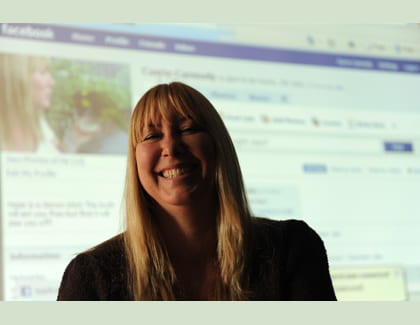Getting in their Facebook
What’s grad student Carrie Carmody doing now? Exploring how adolescents socialize on the Net

Graduate student Carrie Carmody isn’t a teenager, but she spends as much time on Facebook as many of them do. She checks her Facebook page first thing in the morning, throughout the day and before bed.
“Facebook is built into my routine,” she says. “I feel more connected to people. I feel more in the know.”
Carmody has another reason to get friendly with Facebook: She’s researching online social networking for her doctorate in psychology and social behavior, and her findings already have attracted notice among those who study technology’s effect on humans.
She recently won a Distinguished Paper award at the 2009 International Conference on e-Commerce, e-Administration, e-Society and e-Education in Singapore for her entry, “Facebook Me: The Changing Shape of Social Interaction and Identity Exploration in Adolescence.” The 21-page paper by Carmody and two colleagues was chosen from more than 300 submissions by researchers worldwide and cited for its originality.
Her Facebook study began with her usual curiosity about why people do what they do.
“People in the U.S. spend an average of six hours a day on electronic activity. It has to have an effect,” Carmody says. “Technology is changing quickly, but we don’t know how it’s changing us. There’s a need for research in this area.”
In spring 2008, under the guidance of psychology and social behavior professor Jutta Heckhausen, she and two fellow graduate students surveyed UCI undergraduates about their Facebook habits. Their data showed that social networking is three times as addictive as video games and blogging.
“Facebook users are three times more likely to agree with statements like ‘It’s difficult to log off’ and ‘I wish I spent less time than I do’ on Facebook,” Carmody says.
The research also debunked the image of the Facebook junkie as a social recluse. Students with many friends in the virtual world report having a lot of friends in the real one.
“The concept of a Facebook enthusiast as a nerdy Bill Gates kid or socially ostracized child is so yesterday,” Carmody says.
How students utilized a social networking site varied by personality type. “Extroverts use it primarily to connect with people they already know – existing friends,” Carmody says. “Introverts use it to seek out people they don’t know. They find it easier to introduce themselves online.”
She also found that Facebook users tended to share more information about themselves with online acquaintances than they would in person.
“The majority just express themselves too much. Because there’s no filter, the Internet becomes a place to over-emote,” she says. Feelings they otherwise might not share with anyone but their closest friends get vented on Facebook’s Wall and status update features.
Carmody plans to do her dissertation on Facebook, looking at how networking sites affect the psychological development of younger students.
“Seventh-graders are just starting to go to the mall and hang out,” she says. “They’re trying on different identities. Does Facebook help them explore self-images?”
Carmody understands their struggle to define a role. She came to UCI as an undergraduate in 1979 but left to “collect a paycheck” because she couldn’t decide on a career.
“I’ve been every major you can possibly be,” she jokes.
After 25 years in retail management, Carmody went back to school in fall 2003 in Idaho.
She enrolled in graduate school at UCI to become a professor but has developed an interest in administrative policymaking since being elected president of the Associated Graduate Students for this school year.
Carmody helps give a voice to UCI’s nearly 5,000 graduate and professional students, representing them on 11 committees and working with administrators and faculty on issues ranging from funding to academic programs.
“I’m proof that you are not wedded to what you decide to be at 19, 29, 39 or older,” she says. “I still don’t know. The lesson is you don’t have to be one thing.
“I didn’t come here to study Facebook, but I have an interest in adolescent development, and I see a connection between teens’ development and the Internet that I didn’t plan. I’m on this cool wave.”